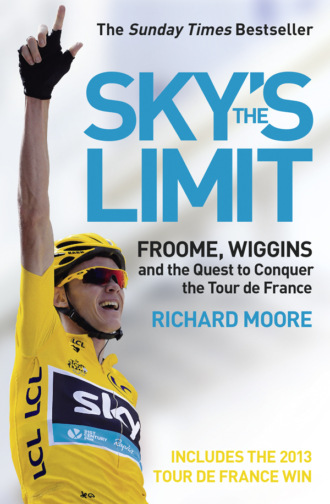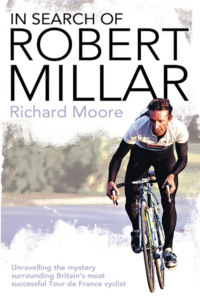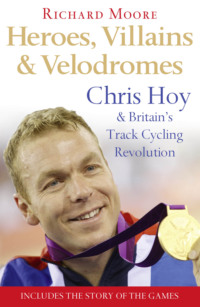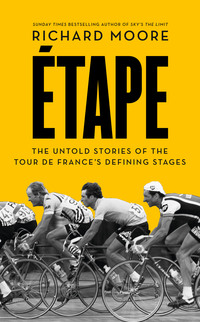
Полная версия
Sky’s the Limit: Wiggins and Cavendish: The Quest to Conquer the Tour de France
Wiggins, who had consistently spoken out against doping – and, indeed, offered this as one reason why he had continued to focus his efforts on the track rather than the road – even found himself indirectly implicated when a Cofidis teammate, Cristian Moreni, tested positive for testosterone in the final week. Moreni was arrested at the summit of the Col d’Aubisque, the gendarmes having waited for him as he finished the 228km stage before carting him off in his cycling kit, while the rest of the Cofidis team, including Wiggins, were given a police escort off the mountain.
Speaking an hour later from a police station, Wiggins admitted he had found the situation ‘scary’: ‘I don’t want to be caught up in this in any way. It makes you think about your future as a professional. What is the point? I could be doing better things than pissing about like this. But then you think, why shouldn’t I continue doing something I get a lot of pleasure out of?’
Not that Wiggins had a choice about continuing in the 2007 Tour, with the organisers requesting their withdrawal and Cofidis obliging. Wiggins was disgusted with Moreni, with his team and with the Tour. He couldn’t bear to wear his Cofidis leisurewear to Pau airport, so he borrowed a T-shirt belonging to David Millar (ironically, Millar’s team, Saunier Duval, later lost a rider, Iban Mayo, to a positive test). Wiggins stuffed his Cofidis clothing in a bin at the airport and never competed for the French team again.
By this point, Mark Cavendish had been withdrawn by his T-Mobile team, who were keen not to overburden their hot young prospect, but Geraint Thomas was still riding, and riding strongly. The youngest rider in the race made it to Paris, in 139th place. He was second from last, but he appeared to have something to spare, and he cut a relaxed figure in the mornings before stage-starts, apparently unfazed by what was going on around him, his mood consistent and his understated humour intact. David Millar compared him to ‘one of the penguins in Madagascar.’ He meant the animated film, ‘where the penguins appear all cute and cuddly, but that disguises a core of steel and a real malevolent streak.’ The highlight of Thomas’ Tour had been an early stage into Montpellier, when the Welshman led the peloton at high speed in the closing kilometres, helping to set up his South African teammate, Robbie Hunter, for the sprint victory. It underlined his ability, his class.
The potential of Thomas and Cavendish, strongly hinted at during their debut season in the professional ranks in 2007, gave Brailsford grounds for optimism and acted as a counterweight to the ‘doom and gloom’ that, to so many other fans and observers of professional cycling, seemed so pervasive. But with the sport at such a low ebb – reaching its lowest point, perhaps, in December 2007, when the German communications giant T-Mobile withdrew their backing of Cavendish’s team – Brailsford might have argued that the time was right to get involved. It could be called the logic of the property market: buy when the prices are low.
Nine months after Bourg-en-Bresse, Brailsford’s search for a backer for his plans to set up a professional road team began in earnest. The road team would be phase three of the British cycling revolution (phase two had produced Thomas and Cavendish, and will be discussed in the next chapter). It seemed a big ask: Brailsford was looking for a British sponsor prepared to fork out around £10m a year. ‘Dave had been in negotiations with British Cycling over his contract,’ says Shane Sutton, ‘and bringing in a pro team was part of his re-negotiations, so after the Manchester World Track Championships [in March 2008] Dave said to me: “You run the Olympic [track] team, and I’ll go out and source some money.” Dave was in meeting after meeting in London; sometimes I went, too. It was good; it gave us a feel for what we wanted.’
One of those meetings was with executives from British Sky Broadcasting. ‘With Sky,’ says Sutton, ‘it wasn’t a case of us selling it to them. I think it was more that they looked at what we were doing, and thought: we need to get hold of these guys who are running cycling.’ In fact, the meeting with Sky was driven by Sky, who – according to one insider – ‘came to us and had a really clear vision of what they wanted to do and how they were going to achieve it.’ Jeremy Darroch, the BSkyB chief executive, told Management Today magazine in March 2010 that he’d been actively seeking a sport to back, which was ‘very much open to all, where it didn’t matter if you were a man or a woman, whether you were young or old. I’d heard about what Dave was doing and I was impressed.’
But as much as Brailsford and Sutton, it was Thomas and Cavendish – especially Cavendish, the ‘goalscorer’ – who seemed to hint at a future in which, as well as on the track, British cyclists also won on the road, maybe even at the Tour de France. Thomas and Cavendish, and others like them, were the rays of sunlight penetrating the gloom. They were the riders who, unlike Bradley Wiggins and the other talented British riders who had never seemed to quite fulfil their potential on the road, could put Britain on the map of continental road cycling.
‘We’re very confident we’ve got a conveyor belt of young talent working now,’ said Brailsford in Bourg-en-Bresse. ‘We always thought that’s what would happen, and I think we’re seeing it now.’
This ‘conveyor belt of talent’ was also known as the British Cycling Academy.
Конец ознакомительного фрагмента.
Текст предоставлен ООО «ЛитРес».
Прочитайте эту книгу целиком, купив полную легальную версию на ЛитРес.
Безопасно оплатить книгу можно банковской картой Visa, MasterCard, Maestro, со счета мобильного телефона, с платежного терминала, в салоне МТС или Связной, через PayPal, WebMoney, Яндекс.Деньги, QIWI Кошелек, бонусными картами или другим удобным Вам способом.





